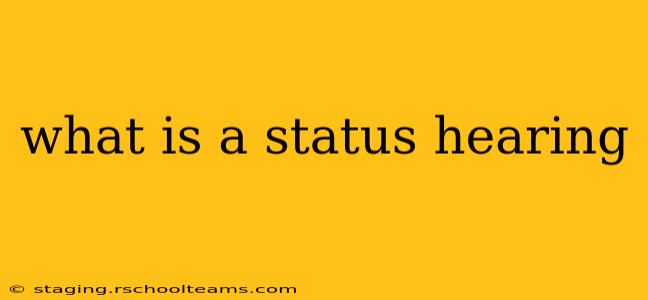A status hearing is a court proceeding where the judge checks the progress of a case. It's not a trial; no evidence is presented, and witnesses aren't called. Instead, the hearing focuses on administrative aspects, ensuring the case moves forward efficiently and fairly. Think of it as a progress report to the judge. This guide will explore various facets of status hearings, answering common questions and providing valuable insights.
What Happens During a Status Hearing?
During a status hearing, the judge, lawyers for all parties involved, and sometimes the parties themselves, meet to discuss the case's current status. The primary goal is to identify any roadblocks and strategize solutions to keep the case moving smoothly towards resolution. Discussions may include:
- Scheduling: Setting deadlines for discovery (exchanging information between parties), filing motions, and scheduling future hearings or trials.
- Discovery Progress: Assessing the progress of information exchange between parties and resolving any disputes arising from the discovery process.
- Settlement Negotiations: Exploring the possibility of a settlement agreement between the parties involved. The judge may encourage or facilitate negotiations but won't force a settlement.
- Case Management: Reviewing the overall case management plan, addressing any unexpected developments, and confirming the parties are adhering to court orders.
- Procedural Matters: Clarifying any procedural issues or questions about court rules and regulations related to the case.
What is the Purpose of a Status Hearing?
The main purpose of a status hearing is to manage the case efficiently and prevent delays. By regularly monitoring progress, the court ensures that:
- Cases are resolved promptly: Identifying and addressing problems early prevents unnecessary delays that can impact all parties involved.
- Justice is served fairly: Status hearings ensure both sides have a fair opportunity to be heard and address any concerns they may have.
- Court resources are used effectively: Regular check-ins allow the court to allocate resources efficiently, preventing unnecessary use of courtroom time and personnel.
Who Attends a Status Hearing?
Typically, the following individuals attend a status hearing:
- The Judge: The presiding judge overseeing the case.
- Attorneys for each party: Representing the plaintiff(s) and defendant(s).
- Parties involved (sometimes): While not always required, the parties themselves may attend, particularly if settlement discussions are a key part of the hearing.
How Long Does a Status Hearing Last?
The duration of a status hearing is highly variable and depends on the complexity of the case and the issues needing discussion. Some hearings may last only a few minutes, while others may extend for an hour or more.
What if I Miss a Status Hearing?
Missing a status hearing can have serious consequences. Failure to attend may result in sanctions from the court, including fines or even default judgment against you (if you're a party to the case). It's crucial to contact the court immediately if you have a conflict or are unable to attend.
Can a Status Hearing Be Conducted Remotely?
Yes, many courts now conduct status hearings remotely via video conferencing or telephone. This allows for greater flexibility and accessibility for all parties involved, particularly helpful in cases involving parties from different locations.
What is the Difference Between a Status Hearing and a Case Management Conference?
While both serve to manage a case, the terms are often used interchangeably. However, a case management conference is usually a more comprehensive and formal meeting held earlier in the case to establish a detailed case management plan. A status hearing, on the other hand, typically occurs later in the process to monitor progress and address specific issues arising since the last hearing or conference.
How Do I Prepare for a Status Hearing?
Preparation is key to a successful status hearing. Attorneys should review all relevant documents, prepare an agenda of issues for discussion, and ensure all parties are informed of the hearing details. If you are a party to the case, consult with your attorney to fully understand the hearing's purpose and your role.
By understanding the purpose and process of a status hearing, parties involved can better navigate the legal system and ensure their case proceeds efficiently and fairly. Remember, communication with your attorney is paramount to understanding your role and preparing adequately for the hearing.
